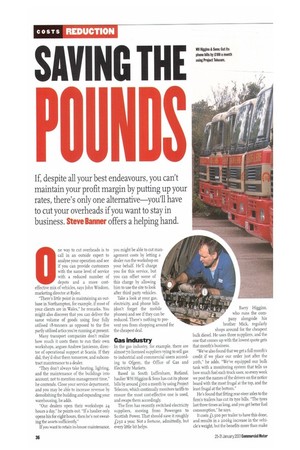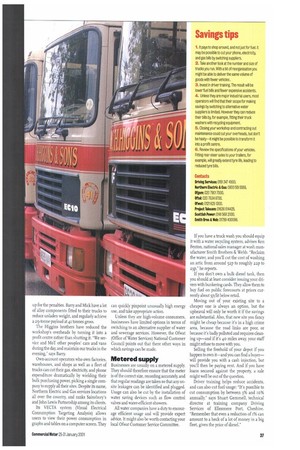SAVING T POUN
Page 38

Page 39

If you've noticed an error in this article please click here to report it so we can fix it.
If, despite all your best endeavours, you can't maintain your profit margin by putting up your rates, there's only one alternative—you'll have to cut your overheads if you want to stay in
business. Steve Banner offers a helping hand.
0 ne way to cut overheads is to call in an outside expert to analyse your operation and see if you can provide customers with the same level of service with a reduced number of depots and a more costeffective mix of vehicles, says John Wisdom, marketing director at Ryder.
"There's little point in maintaining an outbase in Northampton, for example, if most of your clients are in Wales," he remarks. You might also discover that you can deliver the same volume of goods using four fully utilised ig-tonners as opposed to the five partly utilised artics you're running at present.
Many transport companies don't realise how much it costs them to run their own workshops, argues Andrew Jamieson, director of operational support at Scania. If they did, they'd shut them tomorrow, and subcontract maintenance to a dealer.
"They don't always take heating, lighting, and the maintenance of the buildings into account, not to mention management time," he contends. Close your service department, and you may be able to increase revenue by demolishing the building and expanding your warehousing, he adds.
"Our dealers open their workshops 24 hours a day," he points out. "If a haulier only opens his for eight hours, then he's not sweating the assets sufficiently."
If you want to retain in-house maintenance, you might be able to cut management costs by letting a dealer run the workshop on your behalf. He'll charge you for this service, but you can offset some of this charge by allowing him to use the site to look after third party vehicles, Take a look at your gas, electricity, and phone bills (don't forget the mobile phones) and see if they can be reduced. There's nothing to prevent you from shopping around for the cheapest deal.
Gas industry
In the gas industry, for example, there are almost 70 licensed suppliers vying to sell gas to industrial and commercial users according to Ofgem, the Office of Gas and Electricity Markets.
Based in South Luffenham, Rutland, haulier WH Higgins 8c. Sons has cut its phone bills by around Imo a month by using Project Telecom, which continually monitors tariffs to ensure the most cost-effective one is used, and swaps them accordingly.
The firm has recently switched electricity suppliers, moving from Powergen to Scottish Power. That should save it roughly £250 a year. Not a fortune, admittedly, but every little bit helps. Barry Higgins, who runs the company alongside his brother Mick, regularly shops around for the cheapest bulk diesel. He uses three suppliers, and the one that comes up with the lowest quote gets that month's business.
"We've also found that we get a full month's credit if we place our order just after the 20th," he adds. "We've equipped our bulk tank with a monitoring system that tells us how much fuel each truck uses, so every week we post the names of the drivers on the notice board with the most frugal at the top, and the least frugal at the bottom."
He's found that fitting rear-steer axles to the firm's trailers has cut its tyre bills. "The tyres last three times as long, and you get better fuel consumption," he says.
It costs D,5oo per trailer to have this done, and results in a 20 okg increase in the vehicle's weight, but the benefits more than make
up for the penalties. Barry and Mick have a lot of alloy components fitted to their trucks to reduce unladen weight, and regularly achieve a 29-tonne payload at 41 tonnes gross.
The Higgins brothers have reduced the workshop's overheads by turning it into a profit centre rather than shutting it. "We service and MoT other peoples' cars and vans during the day, and maintain our trucks in the evening," says Barry.
Own-account operators who own factories, warehouses, and shops as well as a fleet of trucks can cut their gas, electricity, and phone expenditure dramatically by wielding their bulk purchasing power, picking a single company to supply all their sites. Despite its name, Northern Electric and Gas services locations all over the country, and ranks Sainsbury's and John Lewis Partnership among its clients.
Its VECTA system (Visual Electrical Consumption Targeting Analysis) allows users to view their power consumption in graphs and tables on a computer screen. They can quickly pinpoint unusually high energy use, and take appropriate action.
Unless they are high-volume consumers, businesses have limited options in terms of switching to an alternative supplier of water and sewerage services. However, the Ofwat (Office of Water Services) National Customer Council points out that there other ways in which savings can be made.
Metered supply
Businesses are usually on a metered supply. They should therefore ensure that the meter is of the correct size, recording accurately, and that regular readings are taken so that any onsite leakages can be identified and plugged. Usage can also be cut by the installation of water saving devices such as flow control valves and water-efficient showers.
All water companies have a duty to encourage efficient usage and will provide expert advice. It might also be worth contacting your local Ofwat Customer Service Committee. If you have a truck wash you should equip it with a water recycling system, advises Ken Fenton, national sales manager at wash manufacturer Smith Brothers & Webb. "Reclaim the water, and you'll cut the cost of washing an attic from around 52p to roughly zap to 23p," he reports.
If you don't own a bulk diesel tank, then you should at least consider issuing your drivers with bunkering cards. They allow them to buy fuel on public forecourts at prices currently about 5p/lit below retail.
Moving out of your existing site to a cheaper one is always an option, but the upheaval will only be worth it if the savings are substantial. Also, that new site you fancy might be cheap because it's in a high crime area, because the road links are poor, or because it's badly polluted and requires cleaning up—and if it's 40 miles away, your staff might refuse to move with you.
Selling the freehold of your depot if you happen to own it—and you can find a buyer— will provide you with a cash injection, but you'll then be paying rent. And if you have loans secured against the property, a sale might well be out of the question.
Driver training helps reduce accidents, and can also cut fuel usage: "It's possible to cut consumption by between 3% and ro% annually," says Stuart Gemmell, technical director at training company Driving Services of Ellesmere Port, Cheshire. "Remember that even a reduction of t% can amount to a heck of a lot of money in a big fleet, given the price of diesel."




































































































































































































